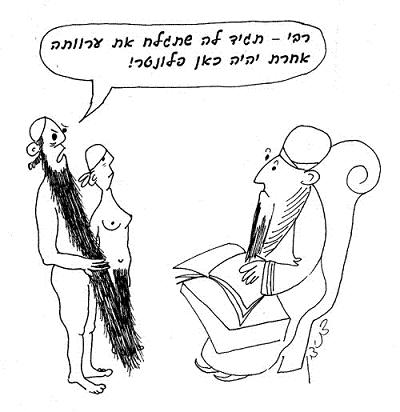
The horrifying story of the concubine in Givah, related in the Scriptures, begins with the woman abandoning her partner to move back with her family. It is written “But his concubine played the harlot against him, and went away from him to her father’s house at Bethlehem in Judah, and was there four whole months” (Judges 19:2).
The sages discussed what act the woman had committed which the Scriptures called playing the harlot. According to one sage, Rabbi Evyatar, the woman offered her partner a plate of food in which there was a fly. Her partner became angry with her and because she was scared she fled to her family. According to a different sage, Rabbi Jonathan, he found a hair. One day Rabbi Evyatar met the prophet Elijah and asked him what G-d currently busied himself with. Elijah the prophet answered: G-d is studying the issue of the concubine in Givah. And what the woman had done to anger her partner to the extent that she had to flee. During the discussion G-d quoted the sages’ versions — according to Rabbi Evyatar he found a fly and according to Rabbi Jonathan he found a hair. Rabbi Evyatar asked the prophet Elijah: Does G-d have doubts? God knows the truth, so why doesn’t he just make a definitive ruling about what the woman had done to her partner? Elijah the prophet answered him: “Both versions suggested by the sages actually happened; her partner found both a fly and a hair. First he found a fly in his food and did not become angry with his concubine, but afterwards he found a hair and became very angry with her. Because she was so afraid of his anger, she fled back to her family, and so the words of both sages are correct.” Elijah said “Both are the words of the living G-d.” The students clarified why the man did not get angry at finding the fly but did get angry at finding the hair. He did not get angry at finding the fly in his food because that oversight was merely disgusting. But the second time he came up against a dangerous oversight which could have castrated him — he saw that she had not shaved her pubic area carefully and left some hairs there which could have become entwined around his sexual organ and cause his castration. (Since the Talmud was edited and written after the issues had been discussed orally for quite some time, it is natural that the discussions handed down were somewhat misquoted and that alternate versions arose. These alternate versions are denoted with the phrase “Some say otherwise…”.) Some say otherwise, that first he found a fly in his bowl, and that it was not the woman’s fault a fly happened to fall into the bowl, so he did not become angry with her. The second time he found a hair in his bowl (not in her pubic area, as in the version above). Since the hair got into his bowl due to the woman’s negligence — she did not take care that no hair fell from her head into his bowl — he became angry with her and she fled in fear back to her family.
(Babylonian Talmud, Tractate Gittin 6b)
